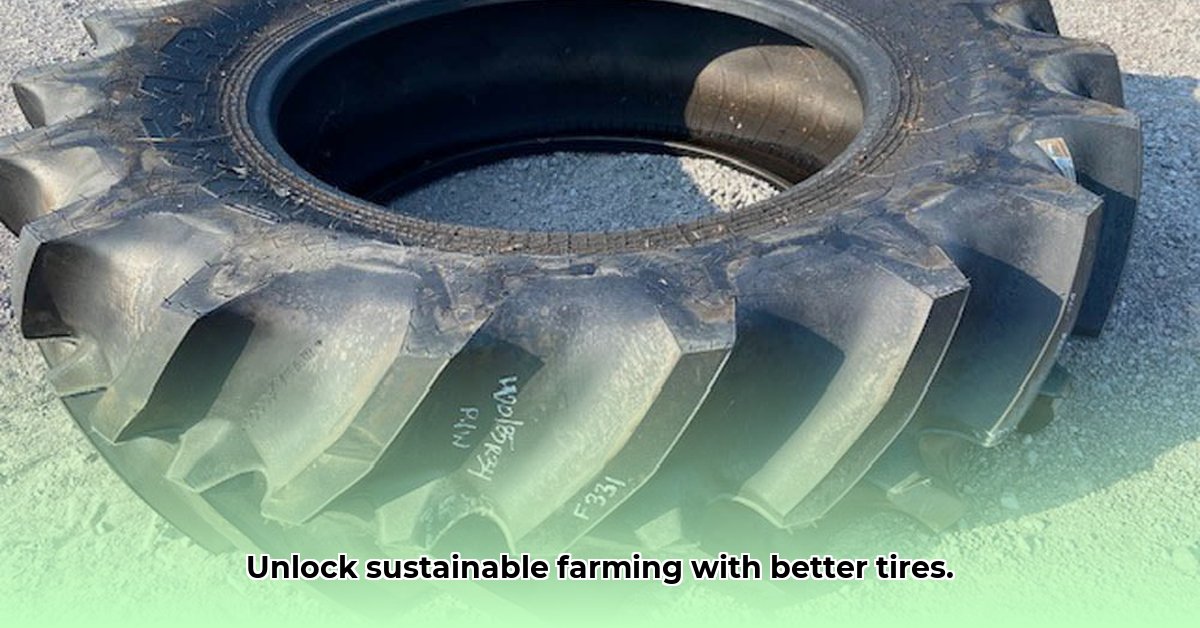
420/85R34 Tractor Tires: A Guide to Sustainable Agricultural Practices
420/85R34 tractor tires are essential for large-scale farming operations, supporting heavy machinery across vast fields. However, their impact extends beyond mere functionality; the choice of these tires significantly influences fuel efficiency, soil health, and overall environmental sustainability. This guide provides practical advice on selecting, maintaining, and disposing of 420/85R34 tires to optimize your farm's sustainability. For more information on smaller tractor tires, check out this helpful resource: smaller tractor tires.
Understanding 420/85R34s: Giants of the Field
These aren't your average tires. 420/85R34s are massive, designed for heavy-duty agricultural equipment like large tractors and combines. Their large size distributes the weight of these machines across a wider area, minimizing soil compaction. This is crucial for maintaining soil health and maximizing yields. Consider the impact on efficiency: operating large-scale farms with smaller tires would significantly increase time and fuel costs.
Sustainability and Your Tires: Navigating the Complexities
The relationship between 420/85R34 tires and sustainable agriculture is complex and multifaceted. While larger tires often mean fewer field passes (reducing soil disturbance), the materials used and their impact on fuel efficiency remain crucial factors.
Reduced Passes, Reduced Compaction: Fewer passes across fields translate to less soil compaction, promoting better water retention and nutrient uptake. This can, in turn, reduce the need for fertilizers and irrigation.
Fuel Efficiency: A key aspect of sustainable farming involves minimizing fuel consumption. Tires with low rolling resistance directly contribute to this goal. However, quantifying the exact fuel savings for 420/85R34s requires further research.
Material Considerations: The sustainability of the tire itself depends on its manufacturing process. Are recycled materials used? Are production methods optimized for minimal environmental impact? These are questions requiring more research.
Data Limitation: Currently, comprehensive data directly comparing the sustainability of various 420/85R34 tire models are limited. Future research should focus on quantifying the environmental impact of different tire designs and materials.
Choosing Sustainable 420/85R34 Tires: A Practical Approach
While comprehensive data is still limited, here's how to make informed choices:
Prioritize Longevity: A durable tire reduces waste and its associated environmental impact. Look for robust construction and quality materials. Isn't a longer-lasting tire a better investment considering replacement costs and landfill space?
Fuel Efficiency: Although specific data for 420/85R34s is limited, aim for tires with low rolling resistance. Check manufacturers' claims and look for independent testing data if available.
Material Composition: When possible, prioritize tires made from recycled materials or sustainable alternatives. Support manufacturers committed to eco-friendly practices. Which manufacturers prioritize sustainable material sourcing in their 420/85R34 lines?
Seek Expert Advice: Consult with experienced agricultural equipment suppliers or tire specialists for advice tailored to your specific farming operation.
Maintenance and Disposal: Maximizing Tire Lifespan and Minimizing Waste
Proper tire maintenance extends lifespan and minimizes waste:
Regular Inspections: Regularly check for cuts, embedded objects, and uneven wear. Address minor issues promptly to prevent major damage.
Proper Inflation: Maintaining correct tire pressure is crucial for fuel efficiency and tire longevity. Underinflation increases fuel consumption and soil compaction, while overinflation causes premature wear.
Responsible Disposal: When tires reach the end of their life, recycle them responsibly. Contact your local waste management facility or tire retailer for proper disposal and recycling options.
Future Trends and Technologies: The Path to Greener Farming
The agricultural tire industry is constantly evolving:
Reduced Rolling Resistance: Ongoing research aims to develop tires with even lower rolling resistance, further minimizing fuel consumption.
Bio-based Materials: The use of renewable materials in tire construction is an active area of research and development.
Smart Tire Technology: Future tires might incorporate sensors to monitor tire pressure and wear, optimizing performance and maintenance.
Conclusion: Building a Sustainable Agricultural Future
Choosing sustainable 420/85R34 tires is vital, but research limitations remain. We can focus on longevity, fuel efficiency, and responsible disposal. Future technological advancements hold promise for even greater sustainability. Remember, every decision you make contributes to a more sustainable and efficient agricultural practice.
Resources
- [Link to relevant agricultural organization (Example: USDA)]
- [Link to tire manufacturer website (Example: Michelin)]
- [Link to relevant research publication (Example: Agricultural Engineering Journal)]
(Note: Replace bracketed examples with actual links.)